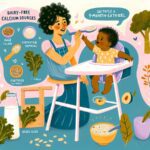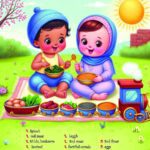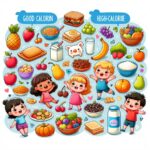The importance of fiber in a toddler’s diet cannot be overstated, serving as a cornerstone for digestive health and overall well-being. As parents, understanding the role of fiber and identifying the best sources can equip us to make informed decisions about our toddler’s nutritional needs. This guide delves into why fiber is essential and highlights the top fiber-rich foods to incorporate into your little one’s diet.
Understanding the Role of Fiber in a Toddler’s Diet
Fiber plays a pivotal role in a toddler’s diet, primarily aiding in digestion and preventing constipation, a common concern among parents. It works by absorbing water, which helps to soften stools and promote a regular bowel movement pattern. Moreover, fiber-rich foods tend to be nutrient-dense, offering a wide array of vitamins and minerals alongside the fiber content.
Aside from supporting digestive health, fiber has been linked to long-term health benefits, including reduced risks of heart disease and certain types of cancer in later life. Therefore, incorporating adequate fiber into a toddler’s diet is not just about addressing immediate digestive concerns but also about laying the foundation for a healthy future.
Importance of Fiber in a Toddler’s Diet and Best Sources
The importance of fiber in a toddler’s diet extends beyond just keeping them regular. It also helps to keep them feeling fuller for longer, which can aid in maintaining a healthy weight. Moreover, fiber plays a crucial role in regulating blood sugar levels, thereby preventing spikes and crashes that can affect a toddler’s energy and mood.
To ensure your toddler gets enough fiber, focus on whole, unprocessed foods. Some of the best sources of fiber for toddlers include fruits like apples, pears, and berries; vegetables such as carrots, broccoli, and peas; whole grains like oats and barley; and legumes, including lentils and beans. Incorporating a variety of these foods into your toddler’s diet can help meet their fiber needs.
Practical Tips for Incorporating Fiber into Your Toddler’s Diet
Incorporating fiber into a toddler’s diet can seem daunting, but with a few simple strategies, it can become an effortless part of meal planning. Start by introducing fiber-rich foods gradually to allow your toddler’s digestive system to adjust. Also, remember the importance of hydration; as fiber absorbs water, ensuring your toddler drinks plenty of fluids is crucial to prevent constipation.
Creative serving ideas can also make fiber-rich foods more appealing to toddlers. Try making smoothies with fruits and vegetables, baking muffins with whole grain flours, or offering snacks like apple slices with peanut butter. The key is to present fiber in a fun and tasty way that encourages your toddler to explore and enjoy these nutritious foods.
For more tips on fiber-rich foods and toddler nutrition, check out our articles on DIY baby food storage and preparation tips, foods to boost the immune system in toddlers during winter, and creative ways to incorporate vegetables into a toddler’s diet.
Ensuring your toddler consumes adequate fiber is a crucial aspect of their overall diet. By understanding the importance of fiber in a toddler’s diet and the best sources, parents can support their child’s health and development. With the right approach and a variety of fiber-rich foods, you can create a balanced and nutritious diet that promotes your toddler’s well-being.
To learn more about toddler nutrition and dietary needs, consider exploring resources such as the USDA’s MyPlate, which offers guidelines and tips for creating balanced meals for young children.













